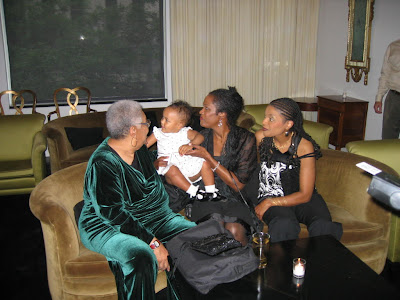My abiding appreciation of her really began back in 1995, when I was teaching 7th graders in New York City, and quickly learned that a few poets spoke directly and immediately to both them and me: Stanley Kunitz; Langston Hughes; Nikki Giovanni; Willie Perdomo; Nicolasa Mohr; and Lucille Clifton. The students could see and hear and feel in the poems of hers that we read from The Book of Light (Copper Canyon Press, 1992), which had only just appeared a few years before, that here was someone who knew how to take her life experiences and turn them into art. I want to repost the second poem in the book, "june 20," which captures the candor and simple but never simplistic power of Ms. Lucille's art:
june 20
i will be born in one week
to a frowned forehead of a woman
and a man whose fingers will itch
to enter me. she will crochet
a dress for me of silver
and he will carry me in it.
they will do for each other
all that they can
but it will not be enough.
none of us know we will not
smile again for years,
that she will not live long.
in one week I will emerge face first
into their temporary joy.
Copyright © Lucille Clifton, 1992, 2010. All rights reserved.
Lucille Clifton with two of her daughters
and her granddaughter before the Ruth Lilly Prize event
A few years ago, Lucille Clifton was in Chicago to receive the Ruth Lilly Prize for Lifetime Achievement from the Poetry Foundation, and I blogged about it, snapping photos as I'm wont to do, and offering one of my little writeups that probably sound to some readers like boilerplate. I mention that event because Ms. Lucille read some of work and spoke to the audience, showing her customary graciousness, bravery, and dignity, and letting everyone know that the award, which had never gone to a Black woman writer, was very well deserved. I'm very grateful to have had the opportunity to be present when Ms. Lucille received that honor, and to have witnessed her being in the world. She was one of the very best, in so many ways. I can only thank her, and know that her work will continue to live on, in me and many others.
Lucille Clifton was born Thelma Lucille Sayles in Depew, New York, in 1936, and grew up in Buffalo. She graduated from high school at the age of 16 and won a scholarship to Howard University, where, as she noted in interviews and public discussions, she was a contemporary of Toni Morrison and Amiri Baraka, and got to know with Sterling Brown. She later attended Fredonia State Teachers College, where she met her husband, Fred Clifton, and began writing poetry, a pursuit that would really flower when the great African-American poet Robert Hayden selected her poems for the YW-YMCA/Discovery Award, which led to her acclaimed first book, Good Times: Poems (1969). She went on to publish a dozen volumes, including Good News About the Earth: New Poems (1972), An Ordinary Woman (1974), Two-Headed Woman (1980), Next (1993), The Terrible Stories: Poems (1996), and Voices: Poems (2008). She also published two memoirs, Generations (1976) and Good Woman: Poems and a Memoir, 1969-1980 (1987), and many books for young and adolescent readers. Ms. Lucille taught at Coppin State University, University of California-Santa Cruz, St. Mary's College, Maryland, and Duke University, among other institutions, and was the Poet Laureate of Maryland from 1979 to 1985. As I noted, she also taught at the Cave Canem summer workshops. Over the years, both inside and outside the classroom, she nurtured so many poets of all ages, and encouraged them to read widely and critically, and to write to the limits of their ability. Her many honors have included the 1997 Lannan Literary Award for poetry, the 1997 Lenore Marshall Poetry Prize, the 1997 Los Angeles Times Poetry Award, the 1999 Lila Wallace/Reader's Digest Award, the 2000 National Book Award for Blessing the Boats: New and Selected Poems, 1988-2000, and three Pulitzer Prize nominations. Lucille Clifton lived and wrote and taught for many years, and we are all the richer for it.


No comments:
Post a Comment